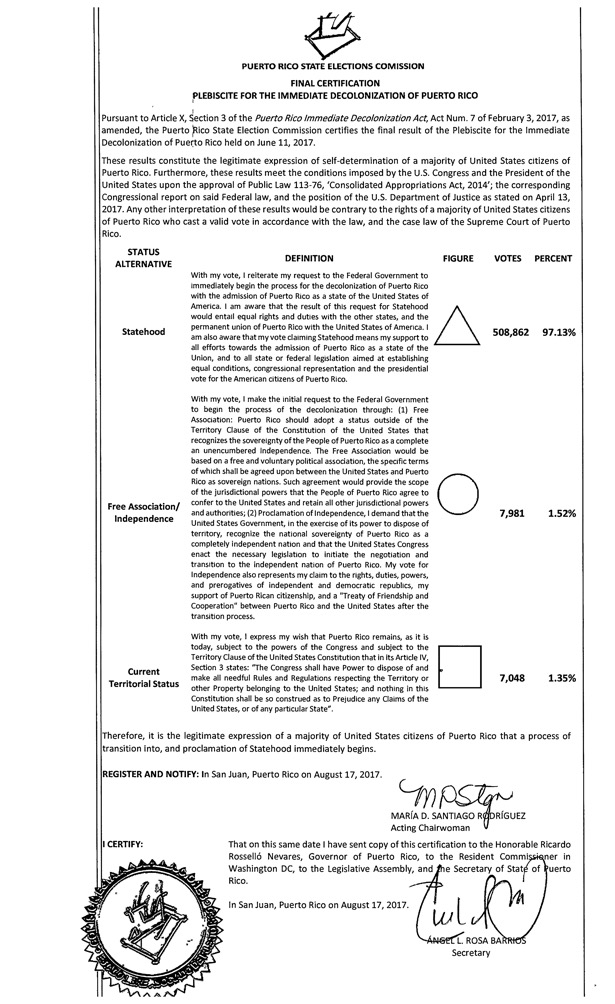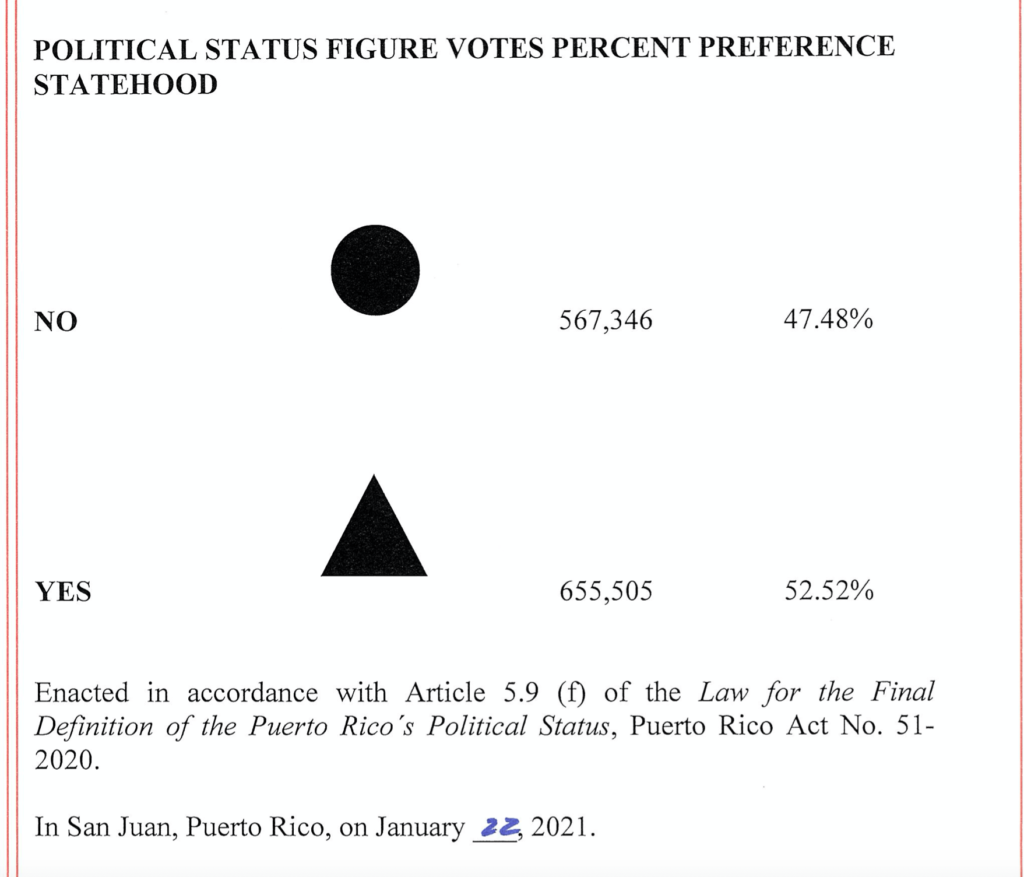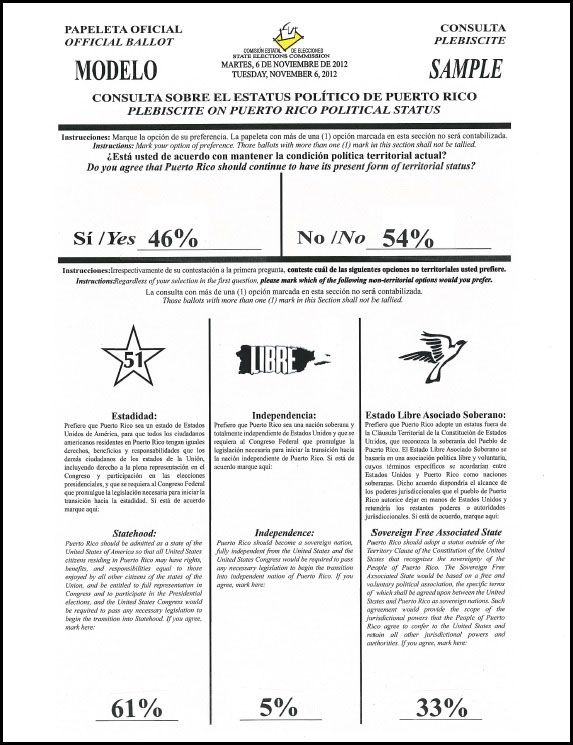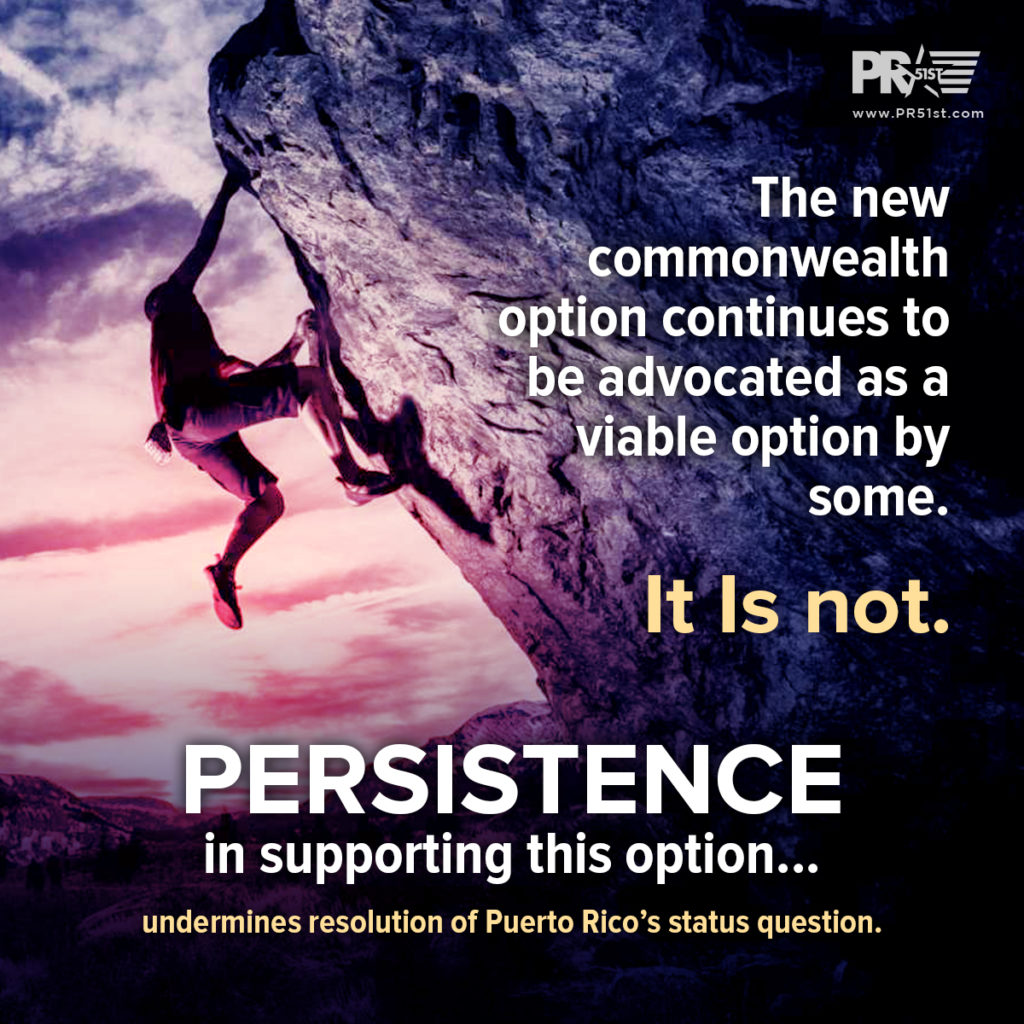Short answer: yes. You can download a PDF of the Certified Official Results of the 2012 Plebiscite, which clearly shows that Puerto Rico voted for statehood. The government of Puerto Rico certified the results, the White House announced that it was a clear vote, and that’s that.
The 2017 plebiscite also had a clear winner: statehood, with 97% of the vote. Download the PDF file of the official results.

You can also see the official results of the 2020 plebiscite. A clear majority voted for statehood.

In other words, Puerto Rico’s voters have chosen statehood three times — in each of the plebiscites conducted during this century.
So why is Puerto Rico still a territory?
Now we need the long answer.
There were two questions on the 2012 ballot.
The first question asked, “Do you agree that Puerto Rico should continue to have its present form of territorial status?” That is, do you want to continue to be a territory?
Here is what the voters said:
- Yes: 46%
- No: 54%
Like so many recent votes in the United States, slightly more than half of the people wanted one thing and slightly less than half wanted the other, but it is certainly clear that a majority of the voters did not want to continue to be a territory.
The second question in 2012
As a territory of the United States, Puerto Rico does not have the same rights and powers as a State, and the people of Puerto Rico, though citizens of the U.S., do not have the full rights of citizenship. The majority of the voters said this was not acceptable to them.
The answer to the first ballot question is clear, but it’s not enough. If Puerto Rico does not remain a territory, it can be either a state or an independent nation. So there had to be a second question.
The second question asked voters to make a further decision. “Irrespective of your answer to the first question, indicate which of the following non-territorial options you prefer. ” The non-territorial options were statehood, independence, and “sovereign free associated state,” which would be a nation in a relationship with the United States which either nation could end at any time.
These three options are the only ones which are possible for Puerto Rico, under the Constistution of the United States. Voters overwhelmingly chose one of the options:
- Statehood: 61%
- Independence: 5%
- Sovereign Free Associated State: 33%
61% of the voters chose statehood. Only 5% chose independence and only 33% chose the option of being a separate country with some kind of association with the U.S. There is no question that statehood got the majority of votes.
The 2017 boycott
In 2017, a resounding 97% of the votes went for statehood. However, the opposing party had called for a boycott. Now, obviously nobody boycotts a vote they can win. But the opposition said that voter turnout was too low on the 2017 plebiscite.
Voter turnout is not an issue in elections in the United States. There is no minimum quorum required. The 2017 referendum had a clear winner.
2020’s clear majority
In 2020, there was no boycott. There was no possible confusion about the meaning of the vote. Voters could choose “Yes” for statehood or “No” for anything else they might want.
53% of the votes were for statehood. Once again, for the third time, Puerto Rico’svoters chose statehood.
So why is there any question about whether Puerto Rico wants statehood?
Uncertainty?
The anti-statehood party of Puerto Rico wanted another option on all those ballots, which is sometimes called “Enhanced Commonwealth” or “Developed Commonwealth.” This option would give Puerto Rico many of the rights of a state, including U.S. military protection, entitlements to financial support, and U.S. citizenship for people born in Puerto Rico, but U.S. Federal laws would not all apply in Puerto Rico.
The U.S. government has said many, many times that this is not a possibility. It is not possible under the U.S. Constitution and the U.S.will not agree to it. Congress, the U.S. Supreme Court, and the U.S. Department of Justice have all said that this option is “not viable” and urged Puerto Rico to stop trying to attain it.
The enhanced commonwealth idea was therefore not on the ballots.
Supporters of this idea believe that since voters did not have this option as one of their choices, the vote was incomplete or manipulated to favor statehood.
If this idea had been on the ballot and had won, as it has in some cases in the past, the U.S. government would have refused it, as they have in the past. Recently, some people in Puerto Rico have proposed that Puerto Rico should return to being a Spanish colony. That idea was also not on the ballot. There is no reason to put impossible things on the ballot.
No uncertainty
It is clear that the people of Puerto Rico want statehood. Congress could have admitted Puerto Rico after any of these plebiscites. Instead, Congress has sidestepped their responsibility.
It is easier to use uncertainty as an excuse for inaction than to make the decision and take action.
As a territory, Puerto Rico has very little say in decisions made by the federal government. If you live in a state, please let your legislators know that you want equality for Puerto Rico through statehood.









23 Responses
State hood now= State 51
I voted for the statehood in the elección celebraded in Puerto Rico I want Puerto Rico to be the 51 state of the Nation
I WANT PUERTO RICO TO BE 51 STATE OF THE NATION
I WANT STATEHOOD NOW
Statehood Now
[…] The bill also sets out a clear process to make Puerto Rico a state if the voters once again vote for statehood. […]
What’s stopping Congress is that big Corporate America, public opinion in the United States plus Wall St don’t want annexation. Congressional Bill HR 727 was introduced by Pierluisi in 2014 to start the Puerto Rico Statehood Admission Process but Congress once again ignored it. Puerto Rico will eventually choose independence which will give the island the necessary bilateral global powers so we can get out of this crisis.
[…] asked for a simple yes or no, this vote would resolve the question of Statehood. If Puerto Rico votes again for Statehood, HR 727 also lays out a path for accomplishing […]
Most of the conservative republicans don’t agree with annexation for Puerto Rico. Puerto Rico had it’s chance in becoming a state when the economy was doing well but that window of opportunity past the PNP by.
¡ Asi mismo ! ¡
Estado ahora !
Those that seek statehood has no idea about freedom and have bwen brainwashed by the statehood welfare propaganda.Puerto Rico Has The Right To Greater Autonomy and the right to become a strong nation and the right to exist as an independent country
Amen!
Puerto Rico =51st state and also dose anyone think they should add the u.s vrigan islands on to puerto rico when they become a state
No, statehood did not win. If 54% voted against the current status, how does that correlate to 61% supporting statehood? Because people don’t support statehood by majority. If you count the 500,000 people that did not vote for the second question, the majority of people opposed statehood.
Sorry elections are not determined by the people who do not vote. Elections are determined by the people who vote.
http://theweek.com/…/puerto-rico-just-filed-bill-statehood-…
[…] hecho, el último referéndum se celebró en 2012: la mayoría (un 61,15 %) de los votantes de Puerto Rico votó por convertirse […]
State 51 Now!
Por siempre UNIDO ala gran corporation USA Puerto Rico state 51 now



Puerto Rico is over-populated and it is just an island. The government can not provide enough housing, jobs or money for the country. P.R’s best course is to accept statehood because it can not function on its own. It is being over-run, with unemployment, welfare, ill-education and low healthcare. Spanish is the primary language but it receives no support from the Spanish crown. The country is already globalized, the only issue is language retainment. In order to become a state, schools would have to teach in English. Preserving a culture is primary. Puerto Rico has a ton of valuables to trade & exchange with, such as rum, coffee, fruits, tourism, localization, history, vegetation, clean ocean water, fishing, medicines and large scale machine industries. Thus, the country hasn’t been optimized yet and still, it is open to prosperity, with better leaders in-mind. Procrasinating takes you nowhere.
I don’t want Puerto Rico to be a state, I am fed up of being
Own, its time for our independence. Vote for it.J
Yeah i think us will join puerto rico
[…] forces at a rate more than double that of those residing in one of the fifty states. Yet despite voting for statehood three times since 2012, Congress has failed to take action. Puerto Ricans remain ineligible to vote for our own […]